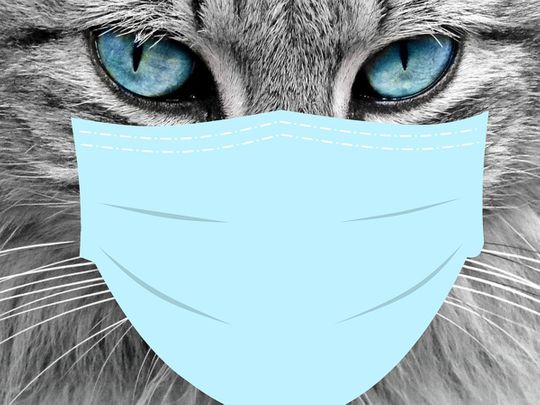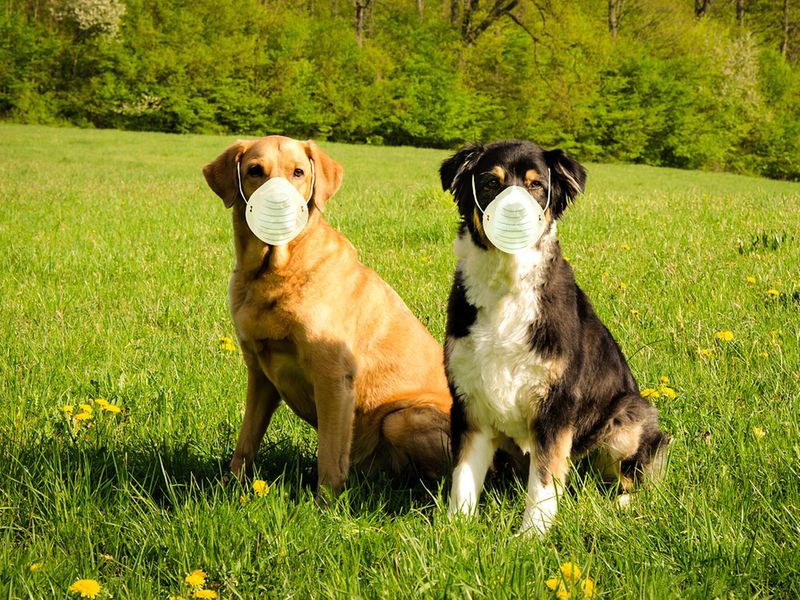
If you have cats and dogs at home, you should certainly take steps to protect them from the new coronavirus. COVID-19 infections of pets have been reported from several countries, and in Slovenia, a ferret is said to have tested positive for SARS-CoV-2. In most cases, pets have caught the virus from people or carers.
Even zoo animals have contracted COVID-19 after exposure to a zookeeper or a caretaker sickened by the virus. Tigers, lions, pumas, cougars, snow leopards and gorillas in zoos, mink on farms, and other mammals are vulnerable to SARS-CoV-2, the virus that causes COVID-19.
Recent research showed coronavirus can also infect many other mammals, including fruit bats, hamsters, pigs, rabbits, racoons and deer. In labs, some of these animals were found to spread the infection to animals of the same species.
Non-human primates like macaques, baboons and marmosets (small South American monkeys with long tails) too are susceptible to SARS-CoV-2 if experiments in labs are any indication. Some studies show chickens and ducks are unlikely to become infected or spread the virus.
Most of these findings are based on experiments on a small number of animals, and so far, there have been no instances of animals spreading the infection to people. But more research is required to confirm it. And scientists are yet to draw up a list of all animals that can contract the new coronavirus.
“There is now an increasing number of studies of pets around the world being published that suggest that asymptomatic infection of pets is quite common,” Professor James Wood, head of the Department of Veterinary Medicine at the University of Cambridge in the United Kingdom, told Medical News Today.
What are the COVID symptoms in pets?
Most infected pets tend to be asymptomatic or display mild COVID symptoms, according to research at the Utrecht University in the Netherlands and the University of Guelph in Ontario, Canada.
Pets sick with the virus that causes COVID-19 may have some of these symptoms like fever, cough, difficulty breathing, lethargy, sneezing, runny nose, eye discharge, vomiting, or diarrhoea.
Can people pass the coronavirus to pets?
The chances of pets contracting COVID-19 is high if any family member has a coronavirus infection. So COVID patients should avoid close contact with their pets as much as possible. This means you should avoid petting, snuggling, being kissed or licked, and sharing food or bedding.
Scientists at the Evandro Chagas National Institute of Infectious Diseases, Oswaldo Cruz Foundation in Rio de Janeiro, Brazil, found that animals tested positive between 11 and 51 days after the onset of symptoms in their carers. The results are published in the journal PLOS ONE.
How fast will cats and dogs recover from COVID-19? Is it fatal?
Animals recover well, according to the Dutch study. It said, “around 20 per cent of exposed pets may be infected, and they eventually clear the infection just as most humans do.” No deaths have been recorded so far.
Why are cats more prone to COVID-19 infection?
Researchers in Canada found that cats are more susceptible to coronavirus infection than dogs. This was confirmed by the Utrecht University study that said cats’ biology may make them more vulnerable to COVID. Cats carry other varieties of coronavirus.
Other research has suggested that felines have a higher capacity for the virus to grow in their cells than dogs or even lab mice, making them more prone to contracting the virus.
Researchers also found that the more time cats spent with a pet owner, the more likely they would be infected. And cats tend to sleep near their owner’s face than dogs, increasing their exposure to infection.
Dogs’ chances of contracting COVID-19 was not dependent on the amount of time spent with their owner.
“It could be something as simple as most dogs have long noses, or the virus doesn’t bind as well to the receptor in dogs’ cells or something with the immune system,” NBC News quoted Sue VandeWoude, university distinguished professor at the Colorado State University College of Veterinary Medicine and Biomedical Sciences, as saying.
■ Pets will experience only mild symptoms, so they can be cared for at home.
■ Take the same precautions you would if a family member became infected.
■ Isolate your pet in a separate room
■ Wear gloves when you interact with your pet or its food, dishes, waste or bedding.
■ Wash your hands after touching any of your pet’s items.
■ Don’t put a face covering on your pet.
■ Don’t wipe your pet with disinfectants. It can be harmful.
■ If your pet’s symptoms get worse, call the veterinarian.
Can animals transmit coronavirus to other animals?
Cats can spread the new coronavirus to other cats without any of them ever having symptoms, experiments show. A study published in the journal Science found cats with the virus in the mouth and nose infect each other through respiratory droplets. Kittens exposed to the coronavirus had massive lesions in their lungs, nose and throat.
Researchers also found cats and ferrets susceptible to the virus when researchers introduced viral particles through the nose.
Can I get COVID-19 from pets?
No. Infectious disease experts say there is no evidence to suggest that animals play a role in spreading COVID-19 to humans. Infections in humans are driven by person-to-person contact or through the air.
“Cats are still much more likely to get COVID-19 from you, rather than you get it from a cat,” Keith Poulsen, director of the Wisconsin Veterinary Diagnostic Laboratory, said.
Researchers at the University of Glasgow said in a study published in the Veterinary Record that “there is currently no evidence of cat-to-human transmission or that cats, dogs or other domestic animals play any appreciable role in the epidemiology of human COVID-19 infections”.
Should I get my pet tested for COVID-19?
No. The US Food and Drug Administration doesn’t recommend routine testing of pets for COVID-19. It appears that the coronavirus can spread from people to animals in some situations. Based on the limited information available to date, the risk of pets spreading the virus is considered below. If your pet is sick, consult your veterinarian who will decide if a COVID-19 test is required.

What should I do if I think my pet has coronavirus?
Call your veterinarian. Tell them about the clinical signs of illness and whether the pet has had close contact with someone who has COVID-19. The veterinarian will decide if a COVID-19 test is required.
When is it safe to end home isolation of pets?
The pets should recover in two weeks after the positive test. Follow your veterinarian’s advice to resume normal activities for the pet. It is safe for your pet to be around other people and animals, if it has had no symptoms for 72 hours without medicines. Also, ensure that the pet has tested negative for coronavirus.
■ Don’t let your dog or cat interact with people or animals outside your household.
■ Avoid dog parks or public places where many people and dogs gather.
■ When walking your dog, keep your dog on a leash and at 2 metres from other people and animals.
■ Do not let other people pet your dog when you are out for a walk.
■ Keep cats indoors when possible.
■ If you are sick with COVID-19, isolate yourself from everyone else, including your pet.
Can the coronavirus spread to people from the skin or fur of pets?
No. There is no evidence that the virus can spread to people from the skin or hair of pets.
Should pets have to be vaccinated against coronavirus?
There is no need to vaccinate pets against COVID-19, although vets in Russia have started vaccinating some animals.
Dr Els Broens, specialist in Veterinary Microbiology, Utrecht University, said: “I don’t see the scientific evidence for that now. It seems unlikely that pets play a role in the pandemic.”
Can sanitisers be used on pets?
The use of hand sanitisers, sanitising wipes, isopropyl alcohol or hydrogen peroxide to clean your pet’s fur or paws is not recommended, as it may be harmful.







